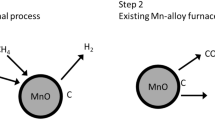Abstract
ONE of the important factors in determining the boundaries of man's conquest of Nature and of space is the rate of reaction of metals and other materials with oxygen. Thus, the design of furnaces and central stations using coal depends on the rate of oxidation of coal particles, and the design of space-vehicles for re-entry depends on the rates of oxidation of carbon, tungsten, molybdenum and other high-temperature materials. A comparison of the absolute rates of oxidation of tungsten, molybdenum and carbon is very enlightening since volatile reaction products are formed during oxidation at high temperatures.
This is a preview of subscription content, access via your institution
Access options
Subscribe to this journal
Receive 51 print issues and online access
$199.00 per year
only $3.90 per issue
Buy this article
- Purchase on Springer Link
- Instant access to full article PDF
Prices may be subject to local taxes which are calculated during checkout
Similar content being viewed by others
References
Gulbransen, E. A., Andrew, K. F., and Brassart, F. A. (in the press).
Gulbransen, E. A., Andrew, K. F., and Brassart, F. A. (in the press).
Gulbransen, E. A., Andrew, K. F., Brassart, F. A., and Blackburn, P. E., WADC-TR-59-575 Part II Contract AF33 (616)-7888, July 1962 (in the press).
Author information
Authors and Affiliations
Rights and permissions
About this article
Cite this article
GULBRANSEN, E. High-temperature Oxidation of Tungsten, Molybdenum and Carbon. Nature 198, 82–83 (1963). https://doi.org/10.1038/198082b0
Issue Date:
DOI: https://doi.org/10.1038/198082b0
This article is cited by
-
Enhanced oxidation resistance of MoTaTiCrAl high entropy alloys by removal of Al
Science China Materials (2021)
-
Formation of single-crystal Cu2O strips in non-single-crystal CuO thin films by continuous-wave laser diode with micro-chevron laser beam (\(\mu\)-CLB)
Journal of Materials Science (2020)
Comments
By submitting a comment you agree to abide by our Terms and Community Guidelines. If you find something abusive or that does not comply with our terms or guidelines please flag it as inappropriate.



